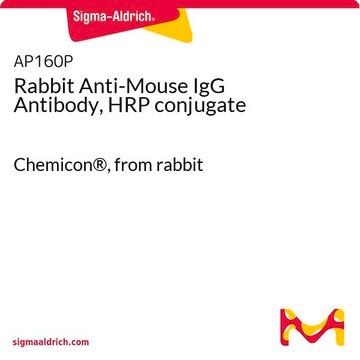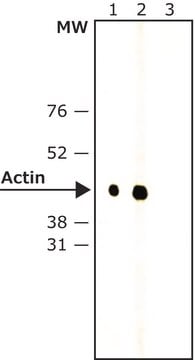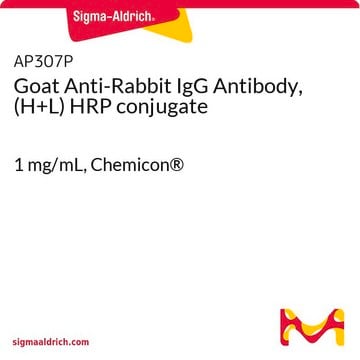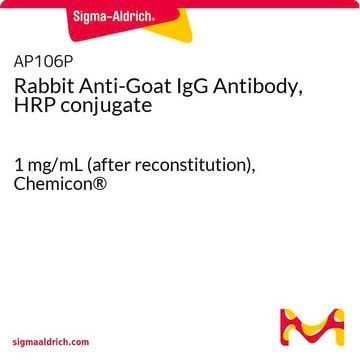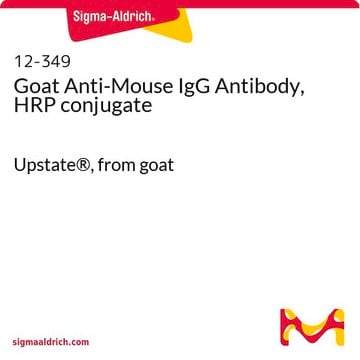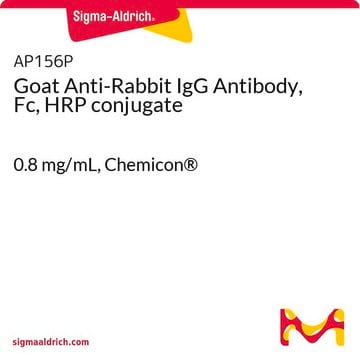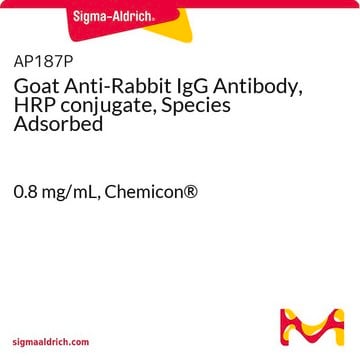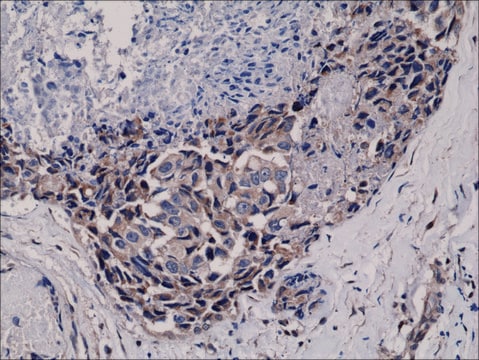AP188P
Mouse Anti-Rabbit IgG Antibody, HRP conjugate, Species Adsorbed
0.8 mg/mL, Chemicon®
Sign Into View Organizational & Contract Pricing
All Photos(1)
About This Item
UNSPSC Code:
12352203
eCl@ss:
32160702
NACRES:
NA.46
Recommended Products
biological source
mouse
Quality Level
conjugate
peroxidase conjugate
antibody form
F(ab′)2 fragment of affinity isolated antibody
antibody product type
secondary antibodies
clone
polyclonal
species reactivity
rabbit
manufacturer/tradename
Chemicon®
concentration
0.8 mg/mL
technique(s)
ELISA: suitable
western blot: suitable
shipped in
wet ice
target post-translational modification
unmodified
Application
EIA and Western blots: 1:5,000-1:200,000.
Immunohistochemistry: 1:500-1:5,000.
Optimal working dilutions must be determined by end user.
Immunohistochemistry: 1:500-1:5,000.
Optimal working dilutions must be determined by end user.
Mouse anti-Rabbit IgG Antibody, HRP conjugate, Species Adsorbed detects level of Rabbit IgG & has been published & validated for use in ELISA & WB.
Physical form
Lyophilized. Buffer = 0.01 M Sodium Phosphate, 0.25 M NaCl, pH 7.6 with 15 mg/mL BSA. Contains no preservative.
RECONSTITUTION:
Reconstitute with sterile distilled water to match the volume indicated on the vial label. Centrifuge product if it is not completely clear after standing for 1-2 hours at room temperature.
RECONSTITUTION:
Reconstitute with sterile distilled water to match the volume indicated on the vial label. Centrifuge product if it is not completely clear after standing for 1-2 hours at room temperature.
Legal Information
CHEMICON is a registered trademark of Merck KGaA, Darmstadt, Germany
Not finding the right product?
Try our Product Selector Tool.
Storage Class Code
11 - Combustible Solids
WGK
WGK 3
Certificates of Analysis (COA)
Search for Certificates of Analysis (COA) by entering the products Lot/Batch Number. Lot and Batch Numbers can be found on a product’s label following the words ‘Lot’ or ‘Batch’.
Already Own This Product?
Find documentation for the products that you have recently purchased in the Document Library.
Customers Also Viewed
Bernard Jover et al.
Biochimica et biophysica acta. Molecular basis of disease, 1863(6), 1568-1574 (2017-03-04)
In the view of the relationships between excessive sodium intake, immunity and target organ damage, we hypothesized that reduction in dietary sodium would be beneficial in the prevention of cardiac alterations through a restrained local immunity response in a rat
Xiao-Dan Wu et al.
Oncology letters, 13(6), 4231-4237 (2017-06-11)
The family of Wnt proteins have been implicated in embryogenesis by regulation of cell fate and pattern formation, and also in human carcinogenesis. Wnt10B was previously shown to be involved in breast cancer development. The present study assessed the association
Hui Liu et al.
Stem cells international, 2016, 2524092-2524092 (2016-01-23)
Resveratrol (trans-3,5,4'-trihydroxystilbene) (RSV) is a natural polyphenol with protective effects over cardiac tissues and can affect cell survival and differentiation in cardiac stem cells transplantation. However, whether this agent can affect cardiomyocytes (CMs) differentiation of induced pluripotent stem cells (iPSCs)
Maëva Chauvin et al.
International journal of oncology, 59(1) (2021-05-21)
Anti‑Müllerian hormone (AMH) type II receptor (AMHRII) and the AMH/AMHRII signaling pathway are potential therapeutic targets in ovarian carcinoma. Conversely, the role of the three AMH type I receptors (AMHRIs), namely activin receptor‑like kinase (ALK)2, ALK3 and ALK6, in ovarian cancer remains to be
Michela Zaffagni et al.
eLife, 11 (2022-03-17)
Viral infection involves complex set of events orchestrated by multiple viral proteins. To identify functions of SARS-CoV-2 proteins, we performed transcriptomic analyses of cells expressing individual viral proteins. Expression of Nsp14, a protein involved in viral RNA replication, provoked a
Our team of scientists has experience in all areas of research including Life Science, Material Science, Chemical Synthesis, Chromatography, Analytical and many others.
Contact Technical Service
